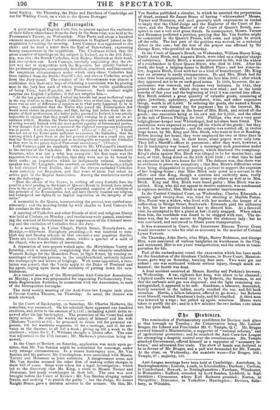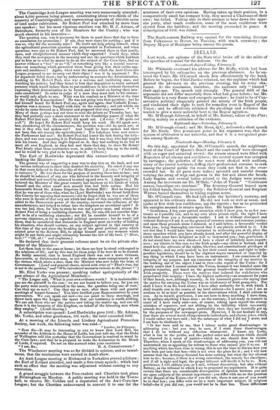Zbe Vrobinces.
The nomination of Parliamentary candidates for Devizes took place at that borough on Tuesday ; the Conservative being Mr. Ludlow Bruges, the Liberal and Free-trader Mr. C. Temple, Q. C. Mr. Bruges avowed himself a Ministerialist, a supporter of "rational reforms," and of agricultural protection ; and he attacked the Anti-Corn-law League for attempting a despotic control over the constituencies. Mr. Temple attacked Government, offered himself as a supporter of "necessary re- forms," and advocated free trade. The show of hands was declared to be in favour of Mr. Bruges, and a poll was demanded for Mr. Temple. At the close, on Wednesday, the numbers were—For Bruges, 202; Temple, 67 ; majority, 135.
Anti-League meetings have been held at Cambridge ; Amersham, in Buckinghamshire ; Lincoln, Louth, in Lincolnshire; Durham ; Carlisle, in Cumberland; Newark, in Nottinghamshire ; Fareham, Winchester, in Hampshire; Stafford, attended by Lord Sandon, Lichfield, in Staf- fordshire ; Cirencester, where Earl Bathurst presided ; Norton, in Shropshire ; Doncaster, in Yorkshire; Huntingdon ; Devizes, Salis- bury, in Wiltshire,
The Cambridge Anti-League meeting was very numerously attended ; about 8,000 persons being present, constituting about two-thirds of the tenantry of Cambridgeshire, and representing upwards of 300,000 acres of land under cultivation. Sir Robert Peel was attacked by more than one speaker : but his most vigorous assailant was Mr. H. J. Adeane, of Babraham, formerly one of the Members for the County ; who was much cheered in his invective— The question was, was it necessary for them to meet there that day to form an association for protection ? If not, they were there for nothing ; and if it was so, why did the necessity arise ? He could not help asking himself, when the agricultural protection question was propounded in Parliament, and when questions were put to Sir Robert Peel, had he answered them in that manly, open, and straightforward manner which they expected ? Could they, when they read the newspapers in the morning and saw the questions which had been put to him as to what he meant to do on the subject of the Corn-laws, find an answer without a "but" or an "if," or something very like a mental reserva- tion—or something which prevented them from giving him their entire sup- port and confidence ? Again, what were the means which the Anti-Corn-law League proposed to use to carry out their object ? was it by argument ? No, for argument failed them ; but by endeavouring to overawe the Administration. Looking to Sir Robert Peel, who was a nervous and vacillating man, and watching his actions, had they found in him that disposition to resist outward pressure which would induce them to put confidence in him without themselves expressing their determination to be heard, and to insist on having their inte- rests considered ? In order to judge of a man they must look to his actions : he would only allude to one. What was his conduct as a Minister at the time of the Catholic Emancipation ? He was not going into that question ; hut he had himself heard Sir Robert Peel say, again and again, that Catholic Eman- cipation was a measure fraught with ruin to the country ; and yet within six weeks he came forward as a Minister and proposed that very measure. * * * Many of them perhaps had not time to read the debate on Thursday last, but they had probably seen a short statement in the Cambridge papers of what Sir Robert Peel had said. He certainly did speak out. (A voice, "He spoke out well.") He hoped Sir Robert Peel would keep his word. He did speak out ; but, considering all the circumstances, the question was—did he speak out, or was it they who had spoken out ? And would he have spoken had there not been this stir among the agriculturists ? The holydays were now over— the Parliament had met : Sir Robert Peel had learnt his task during the holy- days, and was now repeating it in Parliament ; but it was they who had taught him his lesson. And they might depend on it, they had nothing to do hut to meet all over England, as they had met there that day, to show Sir Robert Peel firmly what those sentiments were, in order to keep him up to the mark, and he would be very glad to be kept up to it. (Cheers.) The Earl of Hardwicke deprecated this extraordinary method of backing the Minister— The general way of supporting a man was to slap him on the back, and not by various indications to show they doubted his sincerity. He asked if any one in that room believed in the sincerity of the Minister ? (A voice, "I believe he is insincere.") He was there for the purpose of meeting them face to face ; and be should be ashamed of any one who believed in the honesty and integrity of an individual and would he ashamed to stand up and own it. (Applause.) He believed the Minister of this great country had business on his hands of which himself and the other small men around him had little notion. Had his honourable friend Mr. Adeane forgotten the Reform Bill ? Had he forgotten that he was one of those who, when he (Lord Hardwicke) was thrust forth from this County for opposing that measure—did he forget that he was one of those who were in favour of that very act which had done all this mischief, which had added to the Democratic power of the country, increased the influence of the manufacturers, and helped to infuse into the kingdom an anarchical spirit ? It was too bad, then, for him to state he was not a party-man, and accuse Sir Robert Peel of being a vacillating character. He, for one, did not consider him- self to be of a vacillating character ; nor did he consider himself to be of a nervous character, so far as regarded political occurrences ; but he would tell them, that he considered that statesman in England most unworthy of holding his situation, who should venture, on any subject agitated in this country at this time of day and since the breaking up of the great political party which existed prior to the Reform Bill, to pledge himself upon any measure which might be put forth and might ultimately become the law of the land. (" Hear, hear!" "Oh, oh ! " and confusion.) He declared that their greatest reliance must be on the private cha- racter of the Minister— Let them look to the man at home ; let them see how he stood with regard to the relations of life; and by this test let them judge if he were fit to be trusted. He boldly asserted, that in broad England there was not a more virtuous, honourable, or disinterested man, or one who shone more conspicuously in all the virtues which adorn a man, than the Minister who now holds the reins of Government. (Loud and general cheers, mixed with cries of" That's true, but is not to the question," and "Who introduced measures ruinous to the farmer?")
Mr. Eliot Yorke was present ; speaking rather apologetically of the past silence of the Agricultural Members-
" The League said, What is your own evidence worth ? It is inadmissible : you are the plaintiff in the case : we are not bound to believe you, for you are the party most nearly concerned in the issue, the question being one of rent.' Can they say so now ? Can they say so now, after these wide and general meetings of tenant-farmers? 'You have fortified your Representatives by your movements. We can speak out now—we can point to these meetings, and throw back upon the League the taunt that our testimony is worth nothing. 'We can ask them who are the parties now taking the matter up, and can tell them it is the tenantry of this kingdom, on behalf of the labouring men whom they employ." (Loud cheering.)
A subscription was opened: Lord Hardwicke gave 100!.; Mr. Adeane, Mr. Yorke, and other gentlemen, 501. each ; the total exceeded 800/.
At a meeting of the Lincoln and Lindsey Agricultural Protection Society, last week, the following letter was read-
.' London. 1st February.
"Dear Sir—It may be interesting to you to know that Lord Hill, the seconder of the Address in the House of Lords, has just told me, that the Duke of Wellington told him yesterday that the Government is resolved to stand by the Corn-laws; and that he is prepared to make the declaration in the House of Lords, if required. Do not on this account relax your exertions.
"I am, &c., R. A. CHRISTOPHER." The Winchester meeting was so far divided in opinion, and so tumul- tuous, that the resolutions were carried in dumb show.
An Anti-League meeting at Richmond in Yorkshire proved a failure : the Earl of Zetland attended, and made a free-trade speech ; which had such an effect that the meeting was adjourned without coming to any resolution.
A grand struggle between the Free-traders and Chartists took place at Birmingham on Monday. A public meeting was held in the Town- hall, to receive Mr. Cobden and a deputation of the Anti-Corn-law League; but the Chartists endeavoured to convert it to one for the utterance of their own opinions. Having taken up their position, in a comparatively small but compact body, they moved a Chairman of their own ; but failed. Failing also in their attempt to bear down the oppo- site party, after much confusion, some of the most vociferous were ejected from the building ; and the meeting proceeded in peace. A subscription of 850/. was raised.
The South-eastern Railway was opened for the remaining distance from Folkestone to Dover, on Tuesday, with much ceremony ; the Deputy Mayor of Boulogne being among the guests.



























 Previous page
Previous page